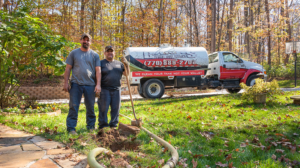Your septic tank is the first treatment step for wastewater from your home. Waste is collected and held in the tank until microorganisms break down any solids.
Aerobic bacteria (bacteria that need oxygen) digest the wastewater, which then flows into your drain field as a liquid. Contact Septic Tank Armadale now!

In a septic tank, wastewater undergoes a settling process. Heavy solids sink to the bottom of the tank, while lighter masses float to the top in a scum layer. Over time, bacteria digest these suspended solids and liquefy the sludge. Wastewater then enters the second chamber, which is aerated to support aerobic bacteria and further break down and separate remaining organic material. Finally, the separated effluent exits the septic tank into a drain field.
Most septic tanks need to be pumped every 2-3 years or as recommended by the manufacturer and your local health department. Pumping removes the sludge and scum layers from the tank. It is important that the septic tank is pumped thoroughly to avoid sludge and scum spilling into your drain fields, which can cause them to overflow and clog.
A professional can help you determine when your septic tank is ready to be pumped. They may use a gauge on the outside of the tank or they may measure the sludge and scum levels inside the tank using a special stick or rod. If you prefer, you can make your own sludge level measuring stick by attaching an 18-24 inch strip of velcro to the end of a seven foot stick.
When the septic tank is due to be pumped, it’s best if someone is at home to greet the pumper and show them where to locate and uncover the septic tank access lids. This ensures they can get the job done quickly and correctly. It also helps to communicate any specific concerns or questions about your septic system with the professional.
Depending on your household size and water usage, your septic tank may need to be pumped more or less often than others. Homes with families, including children and teenagers, typically produce more sludge and liquid waste than empty nesters or single people.
In addition to monitoring your septic tank’s sludge and scum levels, you can minimize the need for pumping by only flushing septic-safe materials. This includes avoiding flushing non-septic-safe items like baby wipes and cat litter, which are not biodegradable.
Cleaning
All of the wastewater from your home’s sinks, toilets, showers, and washing machines goes into your septic system. Solid waste sinks to the bottom of the septic tank, separating from the liquid wastewater or “effluent.” Over time, this material will build up in your tank and require pumping out. If not properly cleaned, this material can overflow into your drainfield and clog the pipes there.
To prevent overflow and ensure that your septic system works properly, it’s essential to have your septic tank cleaned every one to three years. This will remove the sludge from the bottom of the tank and ensure that all liquid wastewater is flowing out through the tank outlet into your absorption field or “soakaway.”
After a septic tank cleaning, the expert will inspect the drainfield to make sure it is free of leaks and cracks. They will also test the functioning of the septic system by using a special probe to measure the liquid levels in your septic tank. If they discover that the septic system is not working properly, they may recommend necessary repairs or replacements.
Septic tanks have baffles to control the flow of wastewater. These baffles can become damaged by septic cleaners or other harsh chemicals. Inspecting and cleaning these baffles will ensure that the septic tank flows out into the absorption field with a clear path.
During the cleaning process, your septic specialist will use a vacuum truck with a high-powered pump to empty out the septic tank. This process will take around 3 to 5 hours. They will check the inlet and outlet pipes for cracks or clogs, and they will disperse a septic tank sludge dissolver throughout your septic system to reduce future clogs.
Although you can clean your septic system yourself, it’s important to remember that powerful cleaning products like bleach, drain cleaners, and antibacterial soaps are not septic safe and can kill the good bacteria in your septic tank. To keep your septic tank clean and working properly, you can use homemade natural cleaning products. For example, pouring a cup of baking soda followed by a cup of vinegar down your drain will help eliminate odors and break down solid waste.
Inspection
If you own a home with a septic system, it’s important to inspect it regularly. An inspection will help you identify problems early, so they can be fixed before they become major issues and affect your plumbing, landscaping or health. Signs of a septic tank issue include strong sewage smells in your house, backed up drains and slow or no water flow.
A septic tank is a buried, water-tight container that holds wastewater from all household plumbing. The solid waste sinks to the bottom of the tank, forming sludge, while fats, oils and grease float to the top, forming scum. A baffle wall (also called a partition wall) separates the compartments in your septic tank, keeping most floating scum and settled sludge in one area and allowing liquid wastewater to enter the next section of the tank.
When the wastewater leaves your septic tank, it flows into an absorption field (also known as a leach field or seepage bed). The effluent is discharged below ground into the soil, where it’s absorbed by the natural soil and grass above.
There are several types of septic systems, but most use the same basic principle. They consist of a septic tank, an absorption field and pipes that carry wastewater from your home to the tank. There are also septic systems that don’t have a tank but instead consist of an underground chamber and perforated pipes that allow wastewater to seep into the surrounding soil.
An inspector will look for signs of a septic tank problem, such as a leaking or ruptured line. They will also check for proper ventilation and drainage. Inspectors may also recommend installing a vent stack to reduce the risk of odors from the septic tank.
If you’re thinking about buying a home with a septic tank, it’s important to ask the seller for the inspection records. You’ll need to know the specifications of the tank and its age, as these factors will determine how often it needs to be pumped and inspected. Additionally, your state or local law may have requirements for septic systems.
Maintenance
Septic systems are designed to handle the waste of people and pets in a way that will not cause harm to water supplies and local ecosystems. The best way to do this is by following a few simple maintenance tips and maintaining a regular relationship with a septic service professional.
The most important thing to do is have the septic tank inspected and pumped regularly. The professional will make a record of the inspection and note when the scum and sludge levels are high. This information can be used to determine when the tank should be pumped again.
In addition, it is important to have the system protected and to avoid using the septic system for things it was not intended for. For example, do not dump paints or flammable cleaning formulas down the drain; instead, dispose of them at a county-designated chemical disposal site. Avoid flushing feminine hygiene products or wipes down the toilet; they can clog the septic system and are a health risk to the environment and people.
Other important steps include keeping a map of the septic system and marking the location of its components with stakes or markers. This will help to prevent damaging the septic system when doing yard work or landscaping. Also, don’t build structures over the septic tank or absorption field, such as swimming pools, hot tubs or gazebos. It is also a good idea to avoid driving vehicles over the area, as the soil can be easily damaged.
A septic tank that is not properly maintained can overflow into the surrounding ground and contaminate nearby drinking water wells, local waterways and other property. This contamination can also affect the health of humans and animals by introducing pathogenic bacteria or viruses. Excess nutrients from septic tank wastewater can also cause algae blooms that consume oxygen in water bodies and threaten the health of fish, birds and other organisms.
A few simple maintenance steps can extend the life of a septic tank and keep it functioning as it should for many years to come. By conserving water, limiting how much is poured down the drains and spreading out water usage throughout the day, the septic system can be more efficient.
